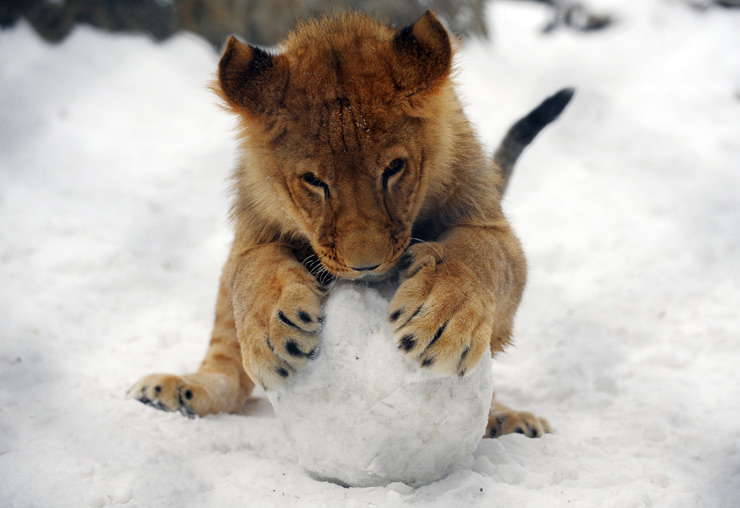Swedish zoo admits killing ‘surplus’ healthy lion cubs
Boras Djurpark defends ‘last resort’ decision to cull nine young lions since 2012

A free daily email with the biggest news stories of the day – and the best features from TheWeek.com
You are now subscribed
Your newsletter sign-up was successful
A Swedish zoo has defended its practice of euthanising healthy lion cubs deemed “surplus”.
Only two of the 13 lion cubs born since 2012 at Boras Djurpark, a wildlife park near Gothenburg which houses around 500 animals, have survived to adulthood. Two died of natural causes, while the other nine were put down despite having no health problems.
Documents seen by Swedish broadcaster STV show that a litter of four lions born in March 2012, called Simba, Nala, Sarabi and Rafiki, were euthanised as “surplus” in autumn 2013.
The Week
Escape your echo chamber. Get the facts behind the news, plus analysis from multiple perspectives.

Sign up for The Week's Free Newsletters
From our morning news briefing to a weekly Good News Newsletter, get the best of The Week delivered directly to your inbox.
From our morning news briefing to a weekly Good News Newsletter, get the best of The Week delivered directly to your inbox.
In 2015, a similar fate befell three cubs christened Kiara, Banzai and Kovu, born the previous year.
The latest litter, four cubs who were born in late 2016, have fared slightly better, the Gothenburg Post reports. On Tuesday, Potter and Weasley were put down, but their siblings Dolores and Granger have found homes at a zoo in England.
The zoo’s chief executive, Bo Kjellson, told STV that the zoo’s strategy was “no secret” and that selective euthanisation was sometimes necessary to avoid unbalancing the zoo’s carefully calibrated care and breeding programme.
The Boras Djurpark aims to give its animal occupants an environment that closely resembles their natural habitat, and Kjellson said that an excess number of lions can disrupt the pack dynamic.
A free daily email with the biggest news stories of the day – and the best features from TheWeek.com
“When the aggression in the group became too much we had to remove some animals,” he said. “We had tried to sell or relocate them to other zoos for a long time but unfortunately there were no zoos that could receive them.”
Kjellson refused to rule out any future killings of healthy lion cubs. “Currently, the group works well, but some of them may become surplus animals,” he said. "We wish we could place the animals in other zoos, but we are fully aware that killing can be the last resort.”
The zoo’s approach may come as a shock to animal lovers, but the practice of culling surplus animals is common
In 2014, Dr Lesley Dickie of the European Association of Zoos and Aquaria, told the BBC that between 3,000 and 5,000 animals are "management-euthanised" in European zoos in any given year, although large mammals make up a small fraction of this total.
The EAZA’s guidelines to zoos and conservation programmes permit euthanisia in instances “where the continued presence of an individual animal is disruptive to the natural dynamic of a group”.
-
 Nuuk becomes ground zero for Greenland’s diplomatic straits
Nuuk becomes ground zero for Greenland’s diplomatic straitsIN THE SPOTLIGHT A flurry of new consular activity in the remote Danish protectorate shows how important Greenland has become to Europeans’ anxiety about American imperialism
-
 ‘This is something that happens all too often’
‘This is something that happens all too often’Instant Opinion Opinion, comment and editorials of the day
-
 House votes to end Trump’s Canada tariffs
House votes to end Trump’s Canada tariffsSpeed Read Six Republicans joined with Democrats to repeal the president’s tariffs
-
 Epstein files topple law CEO, roil UK government
Epstein files topple law CEO, roil UK governmentSpeed Read Peter Mandelson, Britain’s former ambassador to the US, is caught up in the scandal
-
 Iran and US prepare to meet after skirmishes
Iran and US prepare to meet after skirmishesSpeed Read The incident comes amid heightened tensions in the Middle East
-
 Israel retrieves final hostage’s body from Gaza
Israel retrieves final hostage’s body from GazaSpeed Read The 24-year-old police officer was killed during the initial Hamas attack
-
 China’s Xi targets top general in growing purge
China’s Xi targets top general in growing purgeSpeed Read Zhang Youxia is being investigated over ‘grave violations’ of the law
-
 Panama and Canada are negotiating over a crucial copper mine
Panama and Canada are negotiating over a crucial copper mineIn the Spotlight Panama is set to make a final decision on the mine this summer
-
 Why Greenland’s natural resources are nearly impossible to mine
Why Greenland’s natural resources are nearly impossible to mineThe Explainer The country’s natural landscape makes the task extremely difficult
-
 Iran cuts internet as protests escalate
Iran cuts internet as protests escalateSpeed Reada Government buildings across the country have been set on fire
-
 US nabs ‘shadow’ tanker claimed by Russia
US nabs ‘shadow’ tanker claimed by RussiaSpeed Read The ship was one of two vessels seized by the US military